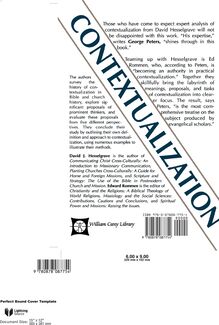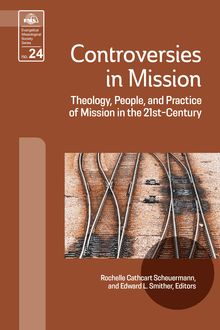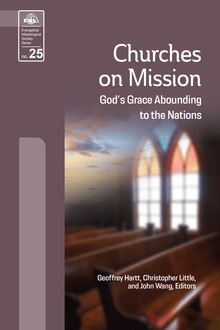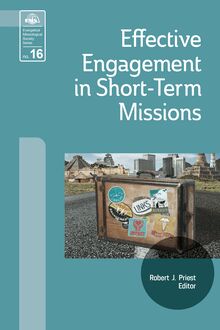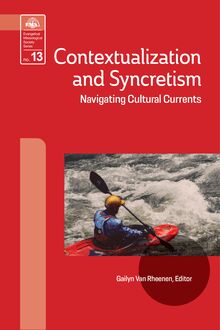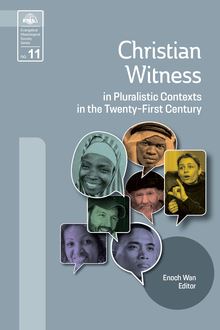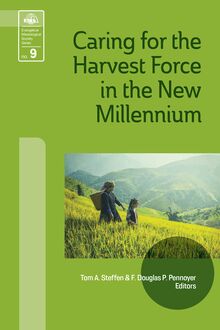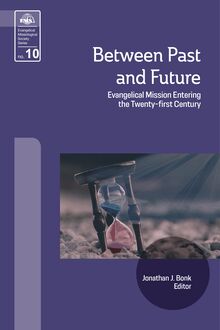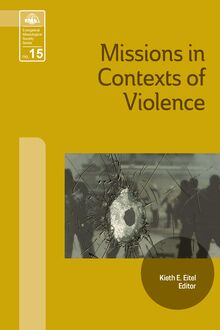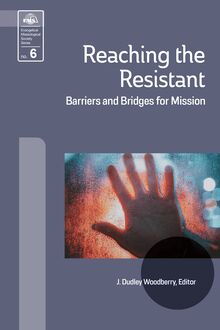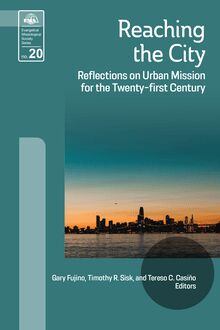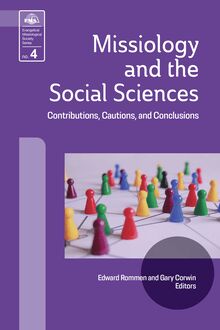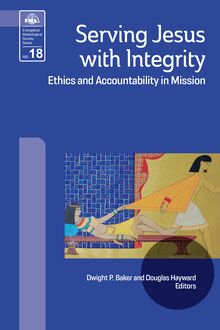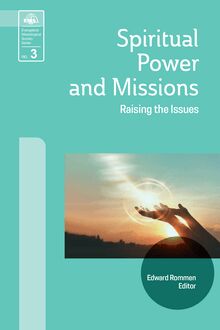-
 Univers
Univers
-
 Ebooks
Ebooks
-
 Livres audio
Livres audio
-
 Presse
Presse
-
 Podcasts
Podcasts
-
 BD
BD
-
 Documents
Documents
-
- Cours
- Révisions
- Ressources pédagogiques
- Sciences de l’éducation
- Manuels scolaires
- Langues
- Travaux de classe
- Annales de BEP
- Etudes supérieures
- Maternelle et primaire
- Fiches de lecture
- Orientation scolaire
- Méthodologie
- Corrigés de devoir
- Annales d’examens et concours
- Annales du bac
- Annales du brevet
- Rapports de stage
La lecture à portée de main
Vous pourrez modifier la taille du texte de cet ouvrage
Découvre YouScribe en t'inscrivant gratuitement
Je m'inscrisDécouvre YouScribe en t'inscrivant gratuitement
Je m'inscrisEn savoir plus
Vous pourrez modifier la taille du texte de cet ouvrage
En savoir plus

Description
Sujets
Informations
| Publié par | William Carey Publishing |
| Date de parution | 15 septembre 1995 |
| Nombre de lectures | 0 |
| EAN13 | 9780878089840 |
| Langue | English |
Informations légales : prix de location à la page 0,0650€. Cette information est donnée uniquement à titre indicatif conformément à la législation en vigueur.
Extrait
Christianity and the Religions
Number 2 in the Evangelical Missiological Society Series
Evangelical Missiological Society Series
#1 SCRIPTURE AND STRATEGY The Use of the Bible in Postmodern Church and Mission by David Hesselgrave
#2 CHRISTIANITY AND THE RELIGIONS A Biblical Theology of World Religions Edward Rommen and Harold Netland, Editors
These books are available from the publisher: William Carey Library PO Box 40129 Pasadena, California 91104 800-647-7466
Christianity and the Religions
A Biblical Theology of World Religions
Edward Rommen and Harold Netland Editors
Number 2 Evangelical Missiological Society Series
Copyright 1995 © by Evangelical Missiological Society All Rights Reserved.
No part of this book may be reproduced or transmitted in any form or by any means—for example, electronic or mechanical, including photocopying and recording—without the prior written permission of the publisher, except brief quotations used in connection with reviews in magazines or newspapers.
Published by William Carey Library 1605 E. Elizabeth Street Pasadena, CA 91104 | www.missionbooks.org
Digital eBook release Primalogue 2017 ISBN: 978-0-87808-984-0
Library of Congress Cataloging-in-Publication Data
Christianity and the religions : a biblical theology of world religions / edited by Edward Rommen and Harold Netland. p. cm. Includes bibliographical references. ISBN 0-87808-376-6 1. Christianity and other religions. 2. Bible--Theology. I. Rommen, Edward, 1947- II. Netland, Harold A, 1955- BR127.C47423 1995 95-36773 261.2--dc20 CIP
Printed in the United States of America 17 16 15 14 13 5 4 3 2 1 SFP
CONTENTS
INTRODUCTION
Harold Netland
PART I: BIBLICAL PERSPECTIVES
1. Religions and the Bible: An Agenda for Evangelicals
Gordon T. Smith
2. Yahweh and the Gods: A Theology of World Religions from the Pentateuch
Ed Mathew
3. Selected Perspectives on World Religions from Wisdom Literature
Michael Pocock
4. “To whom shall you compare me?”: Yahweh’s Polemic against Baal and the Babylonian Idol Gods in Prophetic Literature
Robert B. Chisholm, Jr.
5. The Contribution of the Gospels and Acts to a Biblical Theology of Religions
William J. Larkin, Jr.
6. The Apostle Paul and First Century Religious Pluralism
Don N. Howell, Jr.
7. The Contribution of the General Epistles and Revelation to a Biblical Theology of Religions
Andreas Köstenberger
PART II: HISTORICAL AND DOCTRINAL PERSPECTIVES
8. Christianity and the Religions in the History of the Church
James F. Lewis
9. Religious Borrowing as a Two-Way Street: An Introduction to Animistic Tendencies in the Euro-North American Context
A. Scott Moreau
10. The Uniqueness of Christ in Mission Theology
Charles VanEngen
11. Christianity as a Minority Religion
Larry Poston
PART III: SYNTHESIS
12. Synthesis
Edward Rommen
13. Application
Harold Netland
CONCLUSIONS
14. Conclusion
David J. Hesselgrave
End Notes
INTRODUCTION
Harold Netland
As the Christian Church approaches the twenty-first century it faces both unprecedented opportunities and challenges in missions. On the one hand, the fall of communism, advances in communications technology, and the remarkable rise of the non Western missionary force all indicate opportunities for world evangelization undreamed of just fifty years ago. However, the tragic irony is that at this time of great opportunity the church finds itself increasingly troubled by internal and external pressures resulting in a deep sense of insecurity about its mission in the world.
The modern missionary movement was inspired and sustained largely by firm theological convictions concerning the nature of God, Jesus Christ and humankind. While the significance of social and historical factors in the rise of modern missions cannot be discounted, it was primarily belief in the holiness and righteousness of God, the sinfulness of human beings, and the necessity of repentance and faith in God through Jesus Christ for salvation that motivated the earlier missionaries to carry the gospel to peoples in Asia, Africa, and Latin America.
However, whatever consensus there might have been in the past is currently being eroded by pressures from both inside and outside the Christian community. Missions theory and practice have always been influenced by trends in the broader theological community, and the present is no exception. Traditionally, a focus upon the priority of evangelism has been at the heart of missions. Yet today evangelism, with the explicit intention of eliciting conversion, is increasingly seen as theologically and morally unjustified (Marty and Greenspahn 1988).
Perhaps no other issue illustrates current theological and missiological ferment as clearly as the question of the relation between Christian faith and other religious traditions. The past several decades have produced an enormous body of literature dealing with the subject. The implications of this debate for missions are clear and highly significant. If Jesus Christ is not the unique Lord and Savior for all peoples in all cultures, and if it is not the case that people can be reconciled to God only through the person and work of Jesus, then the traditional missionary movement has been seriously off track. Christian mission-if we are to think in these terms at all-will need to be radically redefined. Not surprisingly, then, missiologist Gerald Anderson says, “No issue in missiology is more important, more difficult, more controversial, or more divisive for the days ahead than the theology of religions... This is the theological issue for mission in the 1990s and into the twenty-first century” (Anderson 1993:200-201).
Religious pluralism raises several distinct sets of issues which demand careful consideration. One cluster of issues concerns the fact of non-Christian religions: Why are there other religious traditions? How should we as Christians think of them? Are they to be dismissed as nothing but satanic deception and falsehood, with no redeeming features whatsoever? Or are they merely sincere but somewhat misguided human attempts to reach God? Do they reflect any genuine knowledge of God? Can they be regarded in any sense as “fore-runners” or “precursors” of Christian faith, so that Christianity is somehow the “fulfillment” of other religions? How should we even try to answer these questions?
Given the centrality of Jesus Christ to Christian faith it is not surprising that questions of Christology and soteriology are at the center of discussions over pluralism: Just who is Jesus Christ? In what sense is he unique and different from other religious leaders? Is he the only Savior for all persons in all cultures, or is he merely one among many alternative saviors? What is the relation between the universality of God’s concern and work in human history and the particularity of God’s self-disclosure in the Incarnation in Jesus? Must one hear about the gospel of Jesus Christ and respond explicitly to Jesus in order to be saved, or is it possible in principle for people who never hear the gospel of Jesus to be saved? If the latter, can we hope that many are saved apart from explicit knowledge of the gospel or just a few? And so on.
It would be a mistake to suppose that these are merely theoretical questions of interest to theologians. Anyone with experience in ministry in pluralistic contexts will recognize that such questions have profound implications for the praxis of missions: To what extent, if any, can one build upon beliefs, practices, and values of other religions in attempting to communicate the message of Scripture to a particular people? How are such decisions to be made? Just what is the biblical understanding of idolatry, and how should current religious practices (ancestor veneration and funeral rites, for example) be evaluated? Is there room for interreligious dialogue in Christian mission, and if so what form should it take? What should be its objectives?
Today there is need for careful and responsible treatment of these questions from a solidly evangelical perspective. This book is an effort in that direction. The first step in formulating an evangelical theology of religions must be a deliberate and comprehensive examination of the biblical data as they relate to these issues. For questions about other religions must always be considered from within the context of God’s self-revelation in the Scriptures. Certainly any adequate theology of religions must be fair and accurate phenomenologically in its depiction of the various traditions. But ultimately a sound understanding of other religions must be shaped and disciplined by what God has revealed in the inspired Scriptures.
The essays that follow attempt to address the contemporary questions raised by religious pluralism by looking again in a fresh manner at the biblical data. It is sometimes assumed today that the world of the biblical writers was so different from our pluralistic world that we cannot expect Scripture to provide reliable guidance for the issues of today (Knitter 1985 :182f). In fact, nothing could be further from the truth. The worlds of the Old and New Testaments were characterized by considerable religious diversity. And it is within this syncretistic and pluralistic context that we find God calling his people to worship and acknowledge him alone as God. Thus, the essays in Part One consider the Old and New Testament writings in an effort to see what light they shed upon contemporary questions of pluralism.
Christian doctrine and practice do not emerge in a social or historical vacuum. Although the current debates over pluralism are unique in some respects, the fundamental issues are not new. Much can be learned through a careful examination of the encounter of Christian faith with other religious traditions throughout history. Essays in Part Two take a fresh look at some historical perspectives on the encounter with oth
-
 Univers
Univers
-
 Ebooks
Ebooks
-
 Livres audio
Livres audio
-
 Presse
Presse
-
 Podcasts
Podcasts
-
 BD
BD
-
 Documents
Documents
-
Jeunesse
-
Littérature
-
Ressources professionnelles
-
Santé et bien-être
-
Savoirs
-
Education
-
Loisirs et hobbies
-
Art, musique et cinéma
-
Actualité et débat de société
-
Jeunesse
-
Littérature
-
Ressources professionnelles
-
Santé et bien-être
-
Savoirs
-
Education
-
Loisirs et hobbies
-
Art, musique et cinéma
-
Actualité et débat de société
-
Actualités
-
Lifestyle
-
Presse jeunesse
-
Presse professionnelle
-
Pratique
-
Presse sportive
-
Presse internationale
-
Culture & Médias
-
Action et Aventures
-
Science-fiction et Fantasy
-
Société
-
Jeunesse
-
Littérature
-
Ressources professionnelles
-
Santé et bien-être
-
Savoirs
-
Education
-
Loisirs et hobbies
-
Art, musique et cinéma
-
Actualité et débat de société
- Cours
- Révisions
- Ressources pédagogiques
- Sciences de l’éducation
- Manuels scolaires
- Langues
- Travaux de classe
- Annales de BEP
- Etudes supérieures
- Maternelle et primaire
- Fiches de lecture
- Orientation scolaire
- Méthodologie
- Corrigés de devoir
- Annales d’examens et concours
- Annales du bac
- Annales du brevet
- Rapports de stage
